
“Dogs laugh, but they laugh with their tails.” —Max Eastman
In This Issue: PuppyUp Walks for October and November; A Short History of Veterinary Oncology; National Animal Safety and Protection Month; Tips for a Safe Halloween for Your Pups; Trials Help Dogs and Humans; Pup of the Month– Lake Norman’s Canine Cancer Hero, Cody; 3 New Puppy Up Gift Items.
PuppyUp Walks for October and November

October and November PuppyUp Walks
The year may be winding down and the weather getting chilly, but the friendship and camaraderie are warm at all our PuppyUp Walks, still in full swing. Coming up in October, we have two remaining walks, and we have two walks in November as well. Here are the dates, times, and locations:
On October 27, PuppyUp Nashville will be from 9:30 AM – 2:00 PM at Edwin Warner Park, Nashville, TN. Registration and other details can be found here.
And on October 28, PuppyUp Fredericksburg, VA will hold their walk from 10:00 AM – 2:30 PM at Hurkamp Park, Fredericksburg, VA. Registration and other details can be found here.
In November we also have two walks scheduled:
On November 3, PuppyUp Lake Norman, NC will hold their walk from 10:30 AM – 1:30 PM at Daveste Vineyards, Troutman, NC. Look for their details here.
And finally on November 10, PuppyUp Little Rock, AR will hold their walk from 11:00 AM – 2:30 PM at MacArthur Park Pavilion, little Rock, AR. Find their details here.
If you don’t see a PuppyUp Walk close to you and would like to organize one, please click on this link and learn how to become a part of the vast and growing Puppy Up Nation of Walks around the country. They’re fun and a great way to connect with other people who have been affected by cancer – either through their pets or themselves. Proceeds from our walks go toward comparative oncology research, education, and outreach. If you’ve heard of or participated in one of our walks, it’s because of the enthusiasm and hard work of those behind the scenes who make these walks possible.
We’re working on next year’s PuppyUp Walk schedule as well. To keep up with the walks we are planning, you can find new walks posted here.
The Puppy Up Foundation would like to thank ALL the people involved in making our goals of education, outreach, and research possible, including our volunteers, supporters, and sponsors. Without you, the many research projects we have helped fund and hope to fund in the future would not be possible. For information on our research grants, please follow this link.
A Short History of Veterinary Oncology
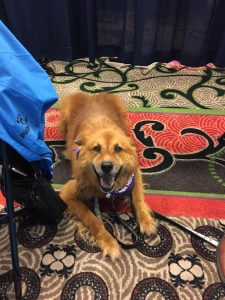
Lilly Morgan is manning the booth at the Veterinary Cancer Society meeting in Louisville
From: Laboratory Equipment
Veterinary Oncology was first recognized as a specialty within veterinary medicine in the US close to 50 years ago. The Veterinary Cancer Society (VCS) was founded in 1976 as a professional organization dedicated specifically to veterinary oncology. The American College of Internal Veterinary Medicine (ACVIM) was founded as an umbrella group for specialties within veterinary medicine in 1973, and Medical Oncology was added as a specialty in 1988. In Europe, the European Society of Veterinary Oncology (ESVONC) was founded in 1982, and oncology was added to the European College of Veterinary Medicine – Companion Animals (ECVIM-CA) in 2009. Two additional leading veterinary oncology societies are the Associação Brasileira de Oncologia Veterinária (Arbrovet), founded in Brazil in 2004, and the Japan Veterinary Cancer Society (JVCS), founded in 2009.
The earliest work in veterinary oncology dates from the mid- to late-1960’s, with work in the US and Europe on tumors in animals beginning to appear in the literature. In the late 1960’s and early 1970’s, regimens for bone marrow transplants in dogs were developed, and the mid-1970’s saw development of vaccines for canine lymphoma.
The World Health Organization (WHO) first published the International Histological Classification of Tumors of Domestic Animals in 1974, followed in 1980 by the TNM Classification of Tumors in Domestic Animals, significant for showing that spontaneous canine and feline tumors are relevant models to study human cancers.
Early studies of immunotherapy regimens in the mid-1980’s showed promise for treatment of canine melanoma, leading to DNA vaccine evaluations in the mid-2000’s that assessed the potential for translation to human patients.
The National Cancer Institute started its Comparative Oncology Program (COP) in 2003, which led to the establishment of the Comparative Oncology Trials Consortium (COTC), a network of 20 academic comparative oncology centers which conducts clinical trials of new therapies in dogs with cancer that may directly or indirectly lead to further development of these therapies for use in human cancer patients. Tumor tissue biobanks provide data and/or tissue for comparative purposes, or to identify genotypes of interest. The Canine Comparative Oncology and Genomics Consortium (CCOGC) and the Pfizer-CCOGC Biospecimen Repository, created in 2012, provides a range of sample types and data for over 2,000 canine patients.
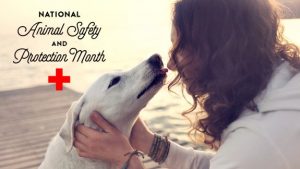
October is National Animal Safety and Prevention Month — a month dedicated to promoting the safe practices of handling and caring for both domestic and wild animals. Animals play an important part in our everyday lives, even if we don’t personally have pets. So it’s vital to make sure that they are treated kindly and with the respect and care they deserve.
National Animal Safety and Prevention Month was created by the PALS Foundation. PALS is dedicated to helping people and animals coexist in a way that benefits all of nature. They believe that humans must come to know the value of all animals, both domestic and wild, and the important role that they play in our ecosystem.
There are several ways you can participate in National Animal Safety and Prevention Month. Some of them are as simple as being aware of the needs of your own household pets. For example, make sure they are micro-chipped so if they are ever lost, they can be easily found and returned; collars with identification tags are also just as important. Pet proof your home against the possibility of your animals coming in contact with any dangerous poisons or toxins. Put together a disaster escape plan in case you ever need to evacuate your pets quickly from the home. There are plenty of things you can do to take that extra step in making sure your pets are protected in all circumstances.
Have a pet first aid kit. For minor injuries and illnesses, a pet first aid kit is essential. You can create your own from human first aid supplies or purchase one online or at a pet supply store. Every pet first aid kit should have these supplies:
· Veterinary and emergency clinic contact information
· Tweezers
· Disposable gloves
· Penlight
· Rectal thermometer
· Cold / heat packs
· Leash
· Gauze
· Bandage rolls
· Wound disinfectant
· Hydrogen peroxide
For the rest of the article, please follow this link.
Sources:
Dog.com
Healthy Paws Pet Insurance
Speaking of safety, here are some great tips on having a safe Halloween for your dogs.
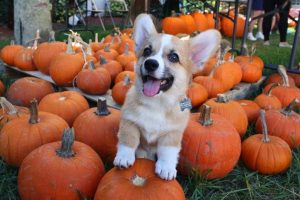
Everything a Pet Parent needs to know about Halloween
By Sassafras Lowrey
From Grok Nation
Halloween can be a lot of fun, but it also brings challenges and safety concerns when sharing the holiday with your pets. Here are a few of my tips for having a spooky, safe and festive Halloween!
Halloween Do’s and Don’t’s for Pet Parents:
Do have a safety plan for your dog during Halloween. With trick-or-treaters roaming the neighborhood, it can be a stressful night filled with unusual sounds, chaos and costumes that can spook dogs. I recommend taking dogs out on leash even if you have a fenced backyard. It’s also a good idea to make a chill space in your home away from the door where your pets can relax. This may include crating your dog with a stuffed toy, or delegating a bedroom or bathroom in your home as the pet’s quiet, safe room with treats, toys and familiar beds.
Don’t share your treats. Candy, and especially chocolate, is very dangerous for your pets. Xylitol is a sugar substitute that is used in a variety of manufactured treats from cakes to candy and is also very toxic to pets. If your pet gets into the trick or treater snacks, it’s a good idea to check in with your local emergency vet clinic (if it’s after your vet’s regular office hours) or the ASPCA Poison Control Center available by phone 24/7.
Do treat your pet to pet-safe festive treats and toys. They deserve it! There are a lot of pumpkin flavored commercially available treats for dogs (I’m very familiar with this because I’m pretty sure I’ve bought all of them already this year!). You can also make your own pumpkin treats at home! Plain canned pumpkin is a healthy treat for dogs. You can mix it into your dog’s Halloween dinner, or stuff it into a Kong or other hollow toy to distract and help your dogs relax on the spooky night.
The rest of the article can be found here.
Trials Help Dogs and Humans
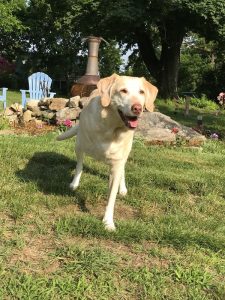
OCTOBER 12, 2018: Hazel, a 12 year old Lab and Weimaraner mix, is missing a leg as a result of the cancer. Courtesy of Kayla Lane
Tufts vet center runs two cancer studies
From the Boston Herald
By Alexi Cohan
Thanks to two new clinical trials at Cummings Veterinary Medical Center at Tufts University, dogs with cancer — like 12-year-old Labrador mix Hazel — have a new lease on life.
Kayla Lane of New London, Conn., was devastated when she found out Hazel had bone cancer.
“She had a bump on her ankle near her paw and we thought she sprained it … she started to limp really bad so we took her to the vet to get an X-ray … the vet said it was cancer,” Lane told the Herald. “It was hard to believe she had bone cancer out of nowhere.”
Lane began taking Hazel to appointments to seek out the best possible treatment when her veterinarian told her about the trials at Cummings, based in North Grafton, that worked to treat dogs with bone cancer, as well as dogs with mast cell tumors and solid tumors. Hazel participated in both trials.
The studies, which are funded by a grant from National Cancer Institute, look at the immune system and its role in helping to prevent tumor spread.
Hazel had to have her leg amputated prior to treatment, endure chemotherapy and take a series of pills that Lane said were difficult to administer.
Dr. Cheryl London, director of the clinical trials office at Cummings, said that while the trials aim to help dogs, they can help humans too.
“Dogs share many physiological similarities to humans, are exposed to the same environment and get many of the same diseases.” London said.
According to London, there are only about 1,000 new cases of bone cancer diagnosed in children and adolescents each year, while 25,000 new cases are found in dogs each year.
London said treatment options for tumor spread are scarce and the trials will serve to “find the best approach that works in dogs with spread and then translate that back to kids with spread.”
Lane said that was one of the main reasons she wanted Hazel to participate in the trial.
“It will help more than just Hazel, it will help research and it will help humans,” Lane said.
Participation in the trial is free to pet owners, something Lane said was a relief.
Lane made the drive from New London to Boston several times to get treatment for Hazel, something she said made a huge impact in the dog’s life.
“We don’t regret doing it and it extended her life with us,” said Lane. “She’s still here and happy.”
[For more on clinical trials at Tufts, please follow this link.]
Pup of the Month — Lake Norman’s Canine Cancer Hero, Cody.
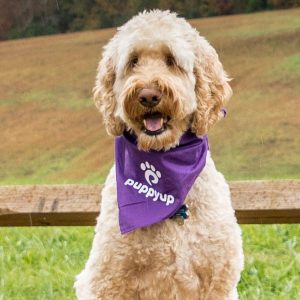
Cody, Lake Norman K9 Cancer Hero.
From PuppyUp Lake Norman
Looking for a little inspiration today? Meet Cody Hurst, Lake Norman’s 2018 Puppy Up Canine Cancer Hero!
Cody recently retired from being a therapy dog with Pet Partners due to battling T-Cell Lymphoma. He has been a therapy dog for the past two years for the House of Mercy, a charity that provides residential care for low-income individuals living with AIDS. He has spent the last two years helping others battle a horrible disease and is now battling his own. Currently, Cody is in remission and continues his chemo treatments to help maintain his remission for as long as possible.
Cody is a fighter – he has lived with double hip-dysplasia his whole life and never let that slow him down. He has an amazing personality that brightens anyone’s day, always has a smile on his face, and is full of affection and love, even on the days he’s feeling the effects of the chemo.
His guardian Chantelle Hurst states, “I am so very proud of him in the way he handles his treatments, he goes in and comes out of the oncologist’s office in the same way, with his tale wagging and a giant smile on his face. He has been the one comforting me through his battle with cancer, when it should be the other way around. He is my hero.”
Just In Time For Holiday Shopping!
Check out these three new Puppy Up items, just in:
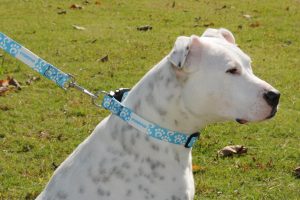
Puppy Up collars and leashes! They’re strong yet stylish, complete with a sturdy metal ring and a Quick Clip collar that’s long-lasting, comfortable, and adjustable. Both the leash and collar are decorated with the Puppy Up logo. Show your support for Puppy Up with these two new items. Great for your pups and as gifts year-round. Click here for the collar and here for the leash.
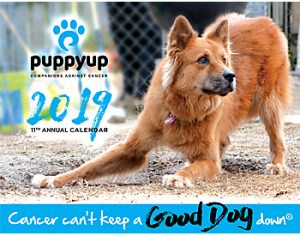
2019 Puppy Up Calendar now available
Add to your shopping list our one-of-a-kind 2019 “Cancer Can’t Keep a Good Dog Down” Calendar. It’s ready to order. This is our 11th annual calendar, and it’s filled with stories and photos of canine cancer heroes, special dog holidays, and national observances. You’ll want to order several for family and friends.
By placing your order soon, you’ll help us determine the quantity we need to print.
The price is $18 each, but if you order 10 or more at one time and use the coupon code “2019Calendar” you’ll receive a discounted price of $15 each.
Please click here to order.
Thanks again to all who entered or donated to this contest.
Calendars are scheduled to ship in November.
We can always use your help. If you’re interested, send me an mail at ginger@puppyup.org.
Sincerely,
Ginger Morgan, Executive Director
The Puppy Up Foundation








